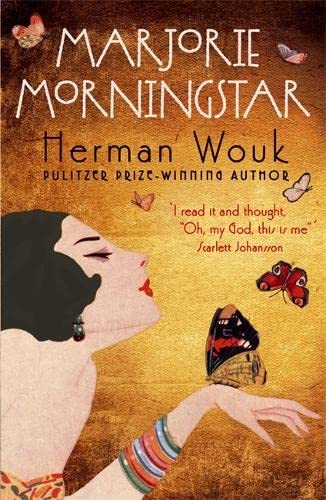“Marjorie Morningstar”
by Herman Wouk

Marjorie Morningstar by Herman Wouk
Originally published 1955
Reviewed by Ed Lengel
The urban ethnic novel is a longstanding genre within the American literary canon, and one that hit its stride with the explosive growth of cities and the rise of mass immigration. Charles Dickens, of course, had pioneered the form in the United Kingdom in the mid-nineteenth century. His preoccupation with the cruelties and injustices of urban life echoed in across the Atlantic in Upton Sinclair’s The Jungle (1906), chronicling the travails of Lithuanian immigrants in turn-of-the-century Chicago. James T. Farrell’s Studs Lonigan trilogy (1932-1935) and Nelson Algren’s Never Come Morning (1942), also set in Chicago, respectively, highlighted the experiences of impoverished Irish and Polish communities. In a more lighthearted vein, but still uncovering themes of poverty and struggle, Betty Smith’s A Tree Grows in Brooklyn (1943) explored the lives of the children of Irish and Austrian immigrants in greater New York City.
The Jewish urban experience has been a much more elusive theme in European and American literature; and one—that for a long time–was far less appealing to popular audiences than, for example, anything featuring Irish characters. Gustav Meyrink’s The Golem (1915), a brilliant if obscure piece centered in Prague’s Jewish ghetto, portrayed the Semitic mystical heritage, and the life stories of Jewish city-dwellers, with equal parts sympathy and horror—not unlike British author Sax Rohmer’s contemporary portrayals of Chinese activities in East London’s Limehouse district. Not until Saul Bellow’s short stories and novels began appearing in the 1940s and 1950s did Jewish life start becoming a substantive element of the American literary scene; but although Bellow received extensive recognition within academe, his works did not enter the mainstream until many decades after publication. The alienation experienced by so many of Bellow’s characters such as Augie March—though vital and authentic—militated by popular acceptance.
Herman Wouk’s novel Marjorie Morningstar (1955) was a barrier-breaking trendsetter, in its portrayal of Jewish life and in its handling of the urban literary environment. Set beginning in 1930s New York, the work chronicles the adventures of young Marjorie Morningstern, an upper-middle class Jewish woman whose family stands one generation removed from its marginal, destitute and culturally segregated origins. Representing a generation seeking to escape a past defined by tradition, religion, and ethnicity, Marjorie changes her last name to Morningstar and works to find success onstage.
During her journey, Marjorie falls in naturally with other artists seeking to escape their origins and become artists, including Wally Wronken and Noel Airman; she falls in love with the latter, and begins an extended relationship. Noel, whose birth name was Saul, is not only a secular Jew, but he also has no time for Jewish culture and religion. Fulfillment and success, he believes, lie in turning away from the past and embracing the increasingly amoral environment fostered and embraced by the gentiles from whom Jews had traditionally maintained their distance. Wouk—a New Yorker and the child of Russian Jewish immigrants—clearly regards Noel as an evil influence. But Marjorie—shamed by Noel’s characterization of traditionally-minded Jewish women as “Shirleys”—is tempted by his vision.
In time, Marjorie comes to question Noel’s rejection of their shared Jewish identity. On a cruise to Paris, she experiences an epiphany that coincides with the collapse of her—and Noel’s—artistic dreams. Turning decisively away from his influence, she returns to New York and abandons her aspirations in favor of a more traditional path. The moral conclusions and implications of Marjorie’s journey are crystal clear.
Marjorie Morningstar was a deeply personal work for Wouk, whose 1951 novel The Caine Mutiny had won the Pulitzer Prize for fiction. The irony of a highly successful male Jewish artist charting a traditional, non-artistic path for his female Jewish main character is impossible to evade, particularly keeping in mind the cultural context of the mid-1950s. Critics were not shy at raising this point, and female readers—anecdotally, at least—were wont to find the ending far less pleasing than were males. For all that, Marjorie Morningstar is an important novel and—like Wouk’s other works including his 1970s epics The Winds of War and War and Remembrance—are equally enjoyable. The 1958 movie version of Marjorie Morningstar, starring Natalie Wood, implied a more liberated future for the main protagonist. More important, subsequent literary depictions of Jewish urban life imitated Wouk’s decidedly modern themes while rejecting the constraints imposed by his traditionalist values.

Ed Lengel is an author, a speaker, and a storyteller.




